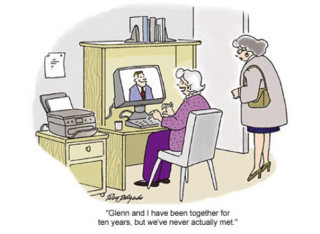Finding Real Love Online
What to look for online to find a good partner.
by Beverly B. Palmer Ph.D.
You meet someone online. Then you text. Then you Zoom or, if possible, meet for coffee. But why, as the interaction increases, do so many of these possible lovers turn into duds?
Maybe it is because what is presented online is not who the person really is. Or maybe it is because spending so much time with people online leaves no time to build relationship skills.
So, what should you look for online in a possible partner? And how do you best present yourself online?
What Are You Looking For?
To find the partner you really want, make a list of the qualities of that person that you feel are important for a good relationship. Consider whether you are looking for a short-term or a long-term relationship because, in a study by Patricia Regan and her associates , both men and women focused on sexual desirability when evaluating a prospective short-term relationship. They cited qualities such as physical attractiveness and athleticism. Yet, when a long-term relationship is desired, honesty, warmth, kindness, and intelligence were cited.
Next, prioritize these qualities. The first three priorities will then become what you will look for in online descriptions. A person who really has those qualities will list them rather than just presenting superficial desirable qualities.
If only one of the qualities you desire is listed, you can use later interactions to ask questions that might elicit the other qualities or even some surprising other desirable qualities. For example, you could ask what qualities the online prospect is looking for. Then you will know whether there is a mismatch in what you both are seeking. Or you could ask about a time when the person told a lie and how they felt about it.
What Are You Not Looking For?
What you often do not see immediately online are some qualities that are red flags. Everyone is initially trying to present an ideal self. And you might be so enamored at the beginning that you are blind to the subtle cues that indicate that person is not a keeper. Often, it isn’t until you are much deeper into the relationship that these red flags begin to show. For example, does the person want others to do things their way; blow hot and cold; get highly threatened by differences of opinion? (More of these red flags can be found in Beverly Palmer’s Love Demystified: Strategies for a Successful Love Life). We all show some of these characteristics some of the time but it is the insistence and persistence of them that create problems in relationships.
How do you find out about characteristics that do not bode well for a long-term relationship when you are just interacting online? One strategy is to ask how they would react in a given situation. Ask, “If someone interrupted you when you were trying to tell them something important, what would you feel and what would you do?” Or, “Tell me about a time when you were disappointed because someone didn’t think or act the way you expected them to.”
How Do You Appear Online?
Now focus on yourself. How are you presenting yourself online? There is not a long list of qualities you have to have in order to be loveable. There is only one main thing you have to do: listen to the other person. Online communication or texting can present some impediments to getting the full message that is being communicated. But, if you pause before shooting off your reply, you can pick up the essence of the message and you can let your partner know what that essence is.
Everyone wants to be listened to and acknowledged that they were heard. Showing you have listened to others makes them feel appreciated and valued. They then love you because you make them feel this way.
To listen closely enough to the other person to understand what they are trying to communicate is not easy. First you have to de-center and focus on the other. You have to let go of any anxiety or concern about how you should respond. Focus entirely on the other person instead of what you are thinking or feeling. After you have heard what was said, do not give your instant reaction. Instead, repeat back the essence of what you heard. After you have acknowledged that you understood what was communicated, you can say what is important to you. Throughout your conversation you have to let the other person know you have listened before stating your point of view.
You might also want to assess how good of a listener the other person is. Because two people showing they are really listening to each other could be the start of a loving relationship.